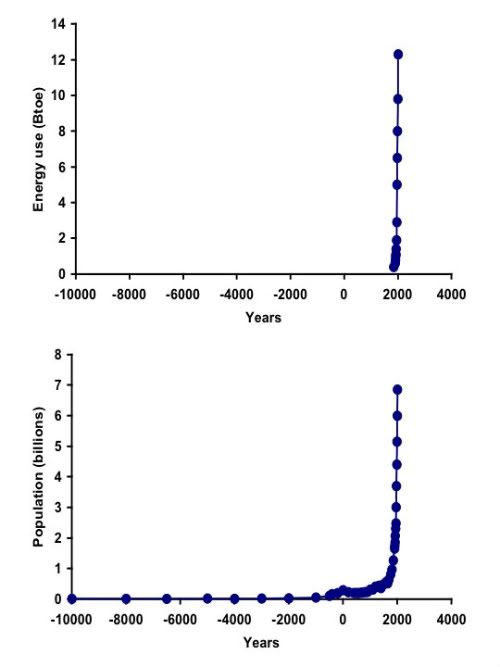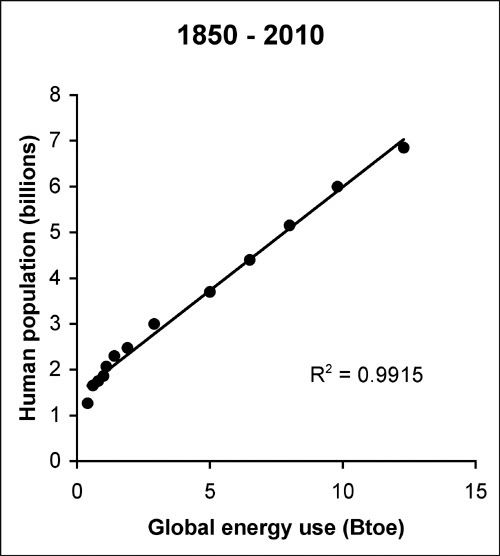Author's posts
May 09 2013
Not the sucrose we ordered II
(this my long-winded continuation of a “review” of JM Greer’s Not the Future We Ordered, from a personal perspective).
To Recap, around the year 2000 was a great time for me. I was scoring grants, doing manic work, the female grad students were kicking me around like a soccer ball (scoring junk goals on me all day long), had fantastically intelligent buddies, and was finishing my dissertation, and headed toward my third long-term major mentor of my choosing (the flagship teaching hospital in my beloved region of SF was merely icing on the cake). Life could not have seemed better, because I was a true believer in what JM Greer calls our “civic religion of progress.”
Not only was it personal progress through long, hard work, but I felt basic research was the right thing to do. For me. For society. I wasn’t out to make money. To paraphrase Pavlov, the revolution was not “out there” in politics or guns in the streets, the revolution was “in here,” in the lab. The real revolution was intellectual. The real revolution was an introvert. Pavlov is no one to sneeze at unconditionally. He’s in the Pantheon of Greatest Scientists Ever, because he saw and demonstrated experimentally anticipatory salivation as perhaps the most powerful mental event ever known, which is learning from experience, and how it occurs through sheer association by contiguity: neurons that fire together wire together, to quote Hebb. And if any Skinnerian “learning by consequence” believers walk into this bar, I will kick their asses from here to next Tuesday, and from week to week, and year to year. We never learn as a specific consequence of our victories and failures. Rather, what is noticed becomes a signal for what is being done, to quote Big Edwin Ray G.
(as a side note, I’ll add that a fellow named Twitmeyer preceded Pavlov at the 1901 APA meeting by three years, showing that people would exhibit an anticipatory knee-jerk to the sight of a hammer blow to the knee tendon; I’ve heard that William James was in attendance, and failed to see the significance, which is nearly impossible to believe, but if true, and had he noticed, we would have been stuck with “Twitmeyerian conditioning” as opposed to “Pavlovian,” which is the more mellifluous.
Anyway, despite my anti-Skinnerian religion, I remained a true believer in Progress. Technology, civics, human rights, law, basic accounting; yep, all a long historical arc bending toward truth and justice. It went against most of what I knew about learning, or about evolution for that matter, but this is just the kind of irrational thinking JM Greer is up against. People like me.
Next time, we’ll talk about my sucrose experiments.
May 08 2013
Not the sucrose we ordered (a review, sort of, JM Greer’s, Not the Future We Ordered)
(I apologize up front for putting this review in a serial format, but I am cacked-out, to the max. It’s a wonder I’m here.)
First, lemme say that John Michael Greer is one gol’ darned level-headed son of a gun. I’ve been reading his blog for years now and no one can cast a cold eye on everything you hold dear and move on with equanimity as he does. Rock solid, he is. Everyone has a “trick pony,” so to speak, and I do wonder how he trained his.
Anyway, he’s written another book, “not the future we ordered” on the topic of peak oil, and how we screwed things up, and moreover how unprepared we are for the consequences. If you are accustomed to his blog, there are no huge surprises, because his writing style remains quite steady, and I would add “soothing,” to someone like me, who gets a bit emotional about these topics.
My personal peak oil revelation (and here’s where it’s “all about me”) began with Bush v. Gore. I was writing my dissertation in experimental psychology when it all broke loose, when, by Jon Schwarz’s insight, you can cut open the insider of DC insiders and out steps James Baker III to attend the lectern of troublemaking. And so it was.
May 06 2013
Greetings Buddies,
Pardon my absence, but I’m still with ya.
Yes, I walked away from Omelas, and it has cost me dearly. Worse yet, walking away has no exits that I can discern. Exiting has no exits. My situation has required me (or will soon require) to re-start torturing children for no good reason and throwing carbon into the atmosphere, all the stuff I try to avoid like the plague. So, “yay!” for the economy. Having any old dirt-throwers income that is completely unrelated to my not inconsiderable education means demand is back, Jack. Let’s party. Unfortunately, when I get home I’m so knackered in the pants I can barely read the toobz, much less comment or write.
This is my pathetic update to my web buddies at my usual sites, posted here at my home base of DD.
This is NOT to say that I’m done bitching. Or helping. Far from it, bitches.
Over and out. Roger, Roger.
CF
Mar 29 2013
Lustig on Colbert
(not a diary, shoot me)
(Essay enough, you just have to frame it- ek)
Colbert is seconds away from interviewing Robert Lustig, prof of childhood obesity.
I’m looking forward because I know Lustig, and wonder how he’ll handle Colbert. I prolly could have made a career of obesity, but I didn’t care in the face of other Malthusian constraints.
Nevertheless, Lustig is impressively knowledgeable, a bit “sugar is hitler,” etc, but if you are interested in obesity, Lustig is worthwhile.
Feb 20 2013
Analyzing the blur (Part 2)
Part 1 described how humans face multiple ongoing, interlocking and spiraling crises of existential proportions, all of which can be conveniently subsumed under the theme of carrying capacity, the ability of an environment to support a population at the limit of sustainability, a limit we have exceeded. The basic elements of the story are these: Through the exploitation of fossil fuels, humans have over-run the planet, cantilevering the entirety of complex industrial society on finite sources of fossil fuels, which we are using to extract itself other resources unsustainably to the point of collapse while altering the basic chemical and biophysical operating conditions of life. Thus, the collapse of the physical environment threatens mass extinction on the order of five previous mass extinction events on Earth. This is not exactly news, yet it’s tenaciously more controversial than it should be. Today’s tour examines how we got locked into one particular death spiral, the “debt spiral,” that keeps us locked into the fossil fuel death spiral.
The very recent “success” of humans in economically advanced countries has culturally engendered a misleading assessment of human accomplishment, deranged notions of wealth, and conditioned unwarranted expectations for more of the same. To borrow a phrase from Jim Hightower, industrial humans were “born on third base and thought they hit a triple.” The baptismal font of fossil fuels has fostered a belief system in which the religion is growth and the supreme being is the Lord of More, an orthodoxy that is both irrational and nearly ubiquitous in industrialized nations, and probably far more damaging than any conventional dogma Richard Dawkins has railed against. The irrationality of this system stems from the simple fact continual growth of any kind is impossible in a finite world.
Despite its root insanity, this belief system has been not merely elevated as a national narrative, but has been reified as the operating system of our physical economy in the form of debt-based financing. Still worse, as the leading global power of “The American Century,” we have pushed to globalize this operating system on the rest of the world, to exert a kind of neocolonial control over resources and political systems through inventive regimes of debt and discipline, and largely succeeded.
On the ascending limb of resource extraction, economic growth, and credit expansion, debt-based assets could be rolled over into the foreseeable future, and interest-laden fiat capital could function as a tradable substitute for actual resources, such as oil. The belief in infinite resource extraction has allowed debt-based fiat economies to runaway from ecological reality. As alluded to in part 1, we are hitting hard limits to physical capacity, leaving only imaginary exponential functions to vary to infinity. The master resource of oil has by any reasonable estimate begun its terminal decline, which guarantees economic contraction, which in turn certifies the impossibility of rolling all the old debt into new debt. Thus the viral proliferation of the operating system has also hit hard limits, and the ascending limb of inflationary credit expansion has transformed into its nasty alter ego of deflationary credit contraction. The American wealth pump has begun to run in reverse. How did we get here?
Feb 18 2013
Analyzing the blur (Part 1)
Since the stolen election of 2000, a cyclonic lot of crazy stuff has been whirling above the surface that previously managed to stay largely submerged in public political consciousness. Among the eye-openers beyond Bush v. Gore were, of course, the 9/11 anomaly, the attacks on Afghanistan and Iraq, and the seemingly arbitrary and endless global war on terror more generally; the looming national security state and the steady erosion of Constitutional and international law; the general feeling that enlightenment has given way to endarkenment; free-ranging corporate malfeasance and immunity; the bursting of various financial bubbles resulting in a generalized, global economic implosion, resulting in turn in massive corporate bailouts and profits, ballooning deficits, joblessness and austerity measures for the masses; an increase in global civil unrest and pushback, including the Arab Spring, the Occupy movement, and anonymous cyber-resistance; rather massive ecological catastrophes and an increasingly alarming pace of numerous climate change indices, including Hurricane Katrina and multiple other extreme weather events; and such an abject failure of the media to report on these developments with any effort approaching due diligence that one not only suspects willful dereliction, but active collusion with various malefactors.
It’s no wonder that 99% of political dialogue is distracted and cannot focus on the major critical factors of our spiraling crises, which happen to be more inter-related than your average kissing cousins. Rather than getting deep into the weeds on any particular topic, it’s worthwhile to zoom out and look at the main populations of events and drivers of these spiraling crises as they are subsumed under a master narrative of carrying capacity, a subject that approaches the brink of taboo in political (but not biological) discussions, insofar as it challenges the main religious orthodoxy of our time, namely, unlimited growth. Let’s see if we can begin by accurately describing our situation in broad, simple strokes. Part 1 (this essay) aims to provide the relevant background narrative for subsequent discussion.
These first two graphs, which are virtually identical, show human energy use (top graph) and human population growth (bottom graph) over the past 12 thousands years or so. Several things should jump out immediately beyond their near identity. First, they are both wildly anomalous spikes in the historical record, one-time, vertical explosions of activity happening simultaneously. Before knowing anything else, the very shape of the functions are cause for serious doubts about the sustainability of these trajectories.
When plotted against one another during the explosive phase, the nearly perfect identity between energy use and human population is confirmed.
Because “behaviorally modern” humans have been around for at least 70,000 years, it would seem this sudden vertical trajectory did not happen because of some sudden evolutionary innovation of the past several hundred years. Rather, these two simultaneous trajectories are consistent with energy being perhaps “the” rate-limiting factor of reproductive success, and humans fell into the Mother Lode, leaving other large mammals in their proverbial dust.
Alternatively, it is possible that an accumulation of post-agricultural/post-division of labor and expertise cultural knowledge reached a critical mass whereby civilization (and population) suddenly bifurcated into an entirely new mode that would have happened independently of energy use. The arguments are not exclusive, but the key experiment would be to remove the energy (a “before-after-before” experiment) to see if the large-brained mammals could maintain anything resembling their current numbers and technological complexity in the absence of energy.
That natural experiment is, in fact, underway, and while the design is adventitious and imperfect, it should provide definitive results.
Feb 12 2013
The amazing retrocolor future
Jan 27 2013
Hillary: the reason we’re rootin’ tootin’ in bum-f***ing Timbuktu
“You can’t say because they haven’t done something they’re not going to do it.”
Clinton was talking about the trivially remote, non-chance that dirt-poor “terrorists” in Mali (AQiM! Who are totally dependent on the arms we supplied to Gaddafi’s opposition in Libya during our previous menage a trois with the formerly cheese-eating surrender monkeys) would attack the US of A, the richest, most prick-bristling aggressors in the history of the planet. However incoherent and nonsensical, Clinton’s statement has an empty ring of truth, not only for Mali, but for every dirt poor country on the planet: just because they haven’t attacked don’t not mean they willn’t. Which is identical in spirit to Dick Cheney’s barking paranoid 1% doctrine, except for being even further off the deep end, in that p = 0.01 of being “attacked out of nowhere” has been reduced by Clinton to a possibility so obscure as to be sub-threshold to a footnote of a fleeting thought that failed being written as a nano-dot on the back of a cocktail napkin during an alcoholic haze that would make Hunter Thompson swear off booze for realz. I’m so old I remember when bum-fucking Timbuktu was a mythological nether world, but it seems we have finally taken a genuine interest in geography as the era of abundance and growth abruptly ends.
Meanwhile, it must have been Tuesday, because reality was observed in the form of a Belgian MP putting his size 13 waffle-stompers into his parliament’s ass on the issue of supporting Western meddling in resource-rich regions of Africa. It’s a friggin’ doozy of a smackdown, if you have any interest in reality refusing to be mugged by Clintonesque constructions.
(sorry, iframe won’t embed, so you have to click on the link. Be sure to click on “cc” closed captions on the vid’s tool bar after the vid starts rolling, in case you don’t understand “fuck you” in French.)
Jan 18 2013
Krugborg: Whatever GDP you want!
Did someone leave the barn door open on the Chinese room experiment? One of the Keynesian mavericks has escaped:
It’s good to have someone questioning the tech euphoria, but I’ve been looking into technology issues a lot lately, and I’m pretty sure he’s wrong: the information technology revolution has only begun to have its impact. Consider for a moment a sort of fantasy technology scenario in which we can produce intelligent robots able to do everything a person can do. Clearly, such a technology would remove all limits on per-capita gross domestic product, as long as you don’t count robots among the capitas. All you need to do is keep raising the ratio of robots to humans, and you get whatever G.D.P. you want.
Sure, I’ll see your bet and raise you one thousand! robots: let’s make all those robots perpetual motion machines, while we’re at it.
Jan 10 2013
Both sides doo-doo it…
The 1953 CIA-sponsored coup that put the Shah back in power in Iran, and the subsequent build-up of SAVAK, the Shah’s brutal internal security force, are certainly black marks in our Cold War history. But it’s not a simple story where we can know that things would have turned out so much better without our meddling. By 1979, Iran had modernized to a remarkable degree, certainly by the standards of the region, and a lot of that was because of American investment. Without submitting to the Hitler-built-good-roads mentality, we can admit that there were many positive consequences for the Iranian people of both the Shah’s reign, and America’s role in sustaining it. One of the tragedies of the Iranian Revolution is that it was taken over by religious fanatics who jettisoned the good along with the bad as far as America’s influence was concerned. On the progressive side, I think there is a constant frustration that the American people are never given the proper context to understand why the Iranian government and (to a degree) the Iranian people are hostile to our country, and especially its foreign policy. The temptation is to overcompensate in the opposite direction, portraying the U.S. as the bad guy and the Iranians as the justifiably aggrieved party.
This impasto of bullshit on blogboard reminds me of David Brooks’ Shit-Brown Period, conceptually AWOL and non-representational, yet physically and graphically present, as if someone had pooped into Duchamp’s signed urinal at the exhibit.
I suppose killing 500,000 Iraqi children with sanctions, or invading Iraq on multiple occasions, are also not “simple stories where we can know that things would have turned out so much better without our meddling,” but I’m guessing that nationalizing some of the world’s largest energy reserves would have turned out rather well indeed for the average Iranian in a world of energy deficits.
ON THE OTHER HAND! Signature drone strikes on wedding parties and children carrying firewood obviously relieved them from the potential suffering of growing old and weary of the world and its people.
How’s that Grand Frog March going, buddy? I’m sure history will say I have misunderestimated you.
Jan 03 2013
trifecta (boxed)!
Here’s what Lord Black (econ PhD & virtually universally well-liked blogger, quoted even by Kthultu) said:
Grow the damn economy and the deficit disappears. The end.
I merely add this observation to “Armando, you ignorant slut,” and “booman’s Christmas ass-kicking,” in order to drive home my point, that not all things are that simple, are they? Nor should they be to liberals, in particular, the devotees to reality and reason. These spiraling crises (resources, energy, & econ) are systemic. So, quit acting like fools. I always imagined you as smarter, but yer failin’ big. Republican Big.
I honestly recommend Sir Stirling as a starting point for your madness. It will help maintain your Earth’s orbit, at least.





